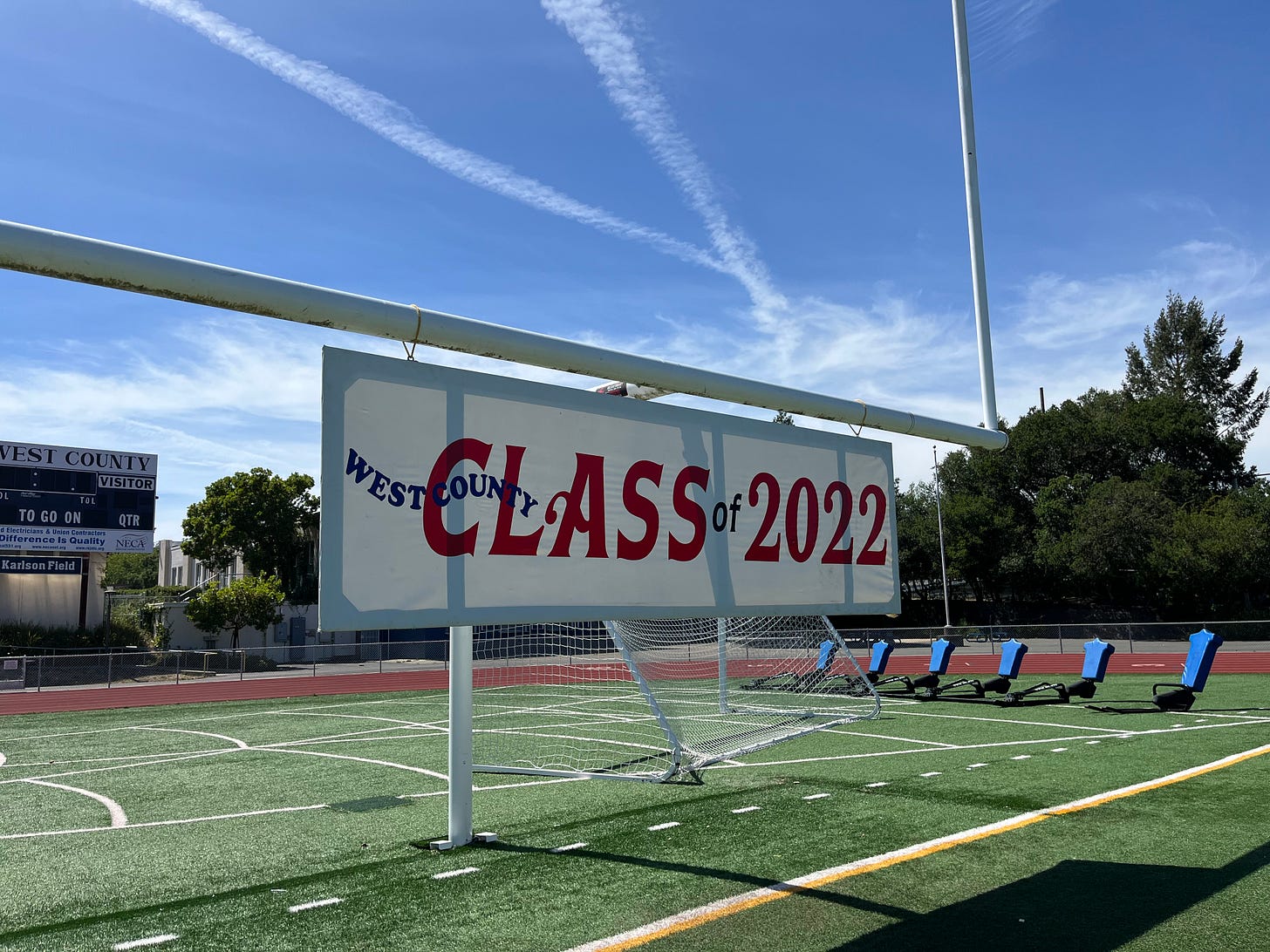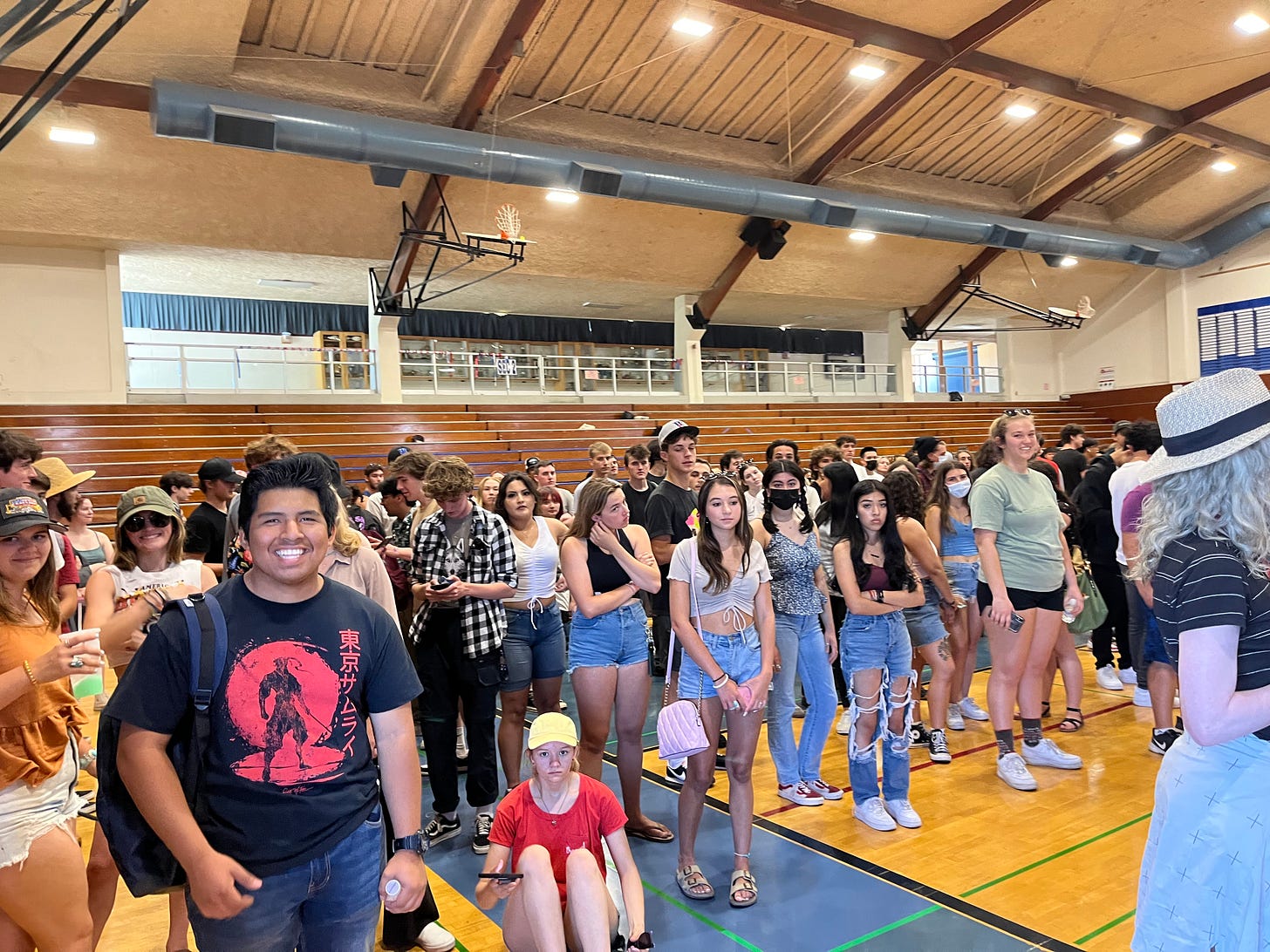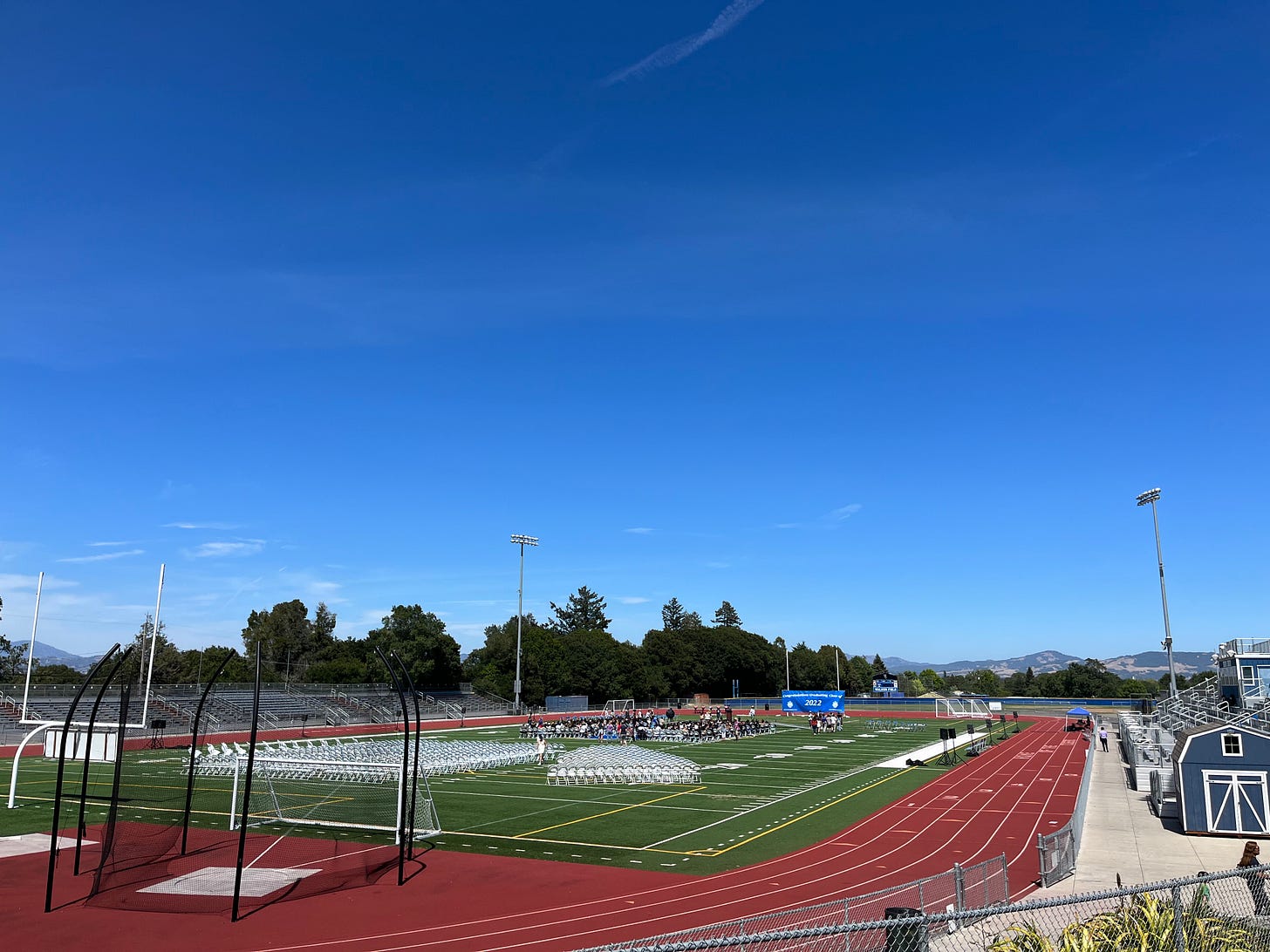Real Answers from WCHS Class of 2022
Graduation Day is June 2nd for West County High School. It's fair to say that the Class of 2022 had a unique high school experience and the wisdom to show for it.
Recently, I interviewed Nicole Wilkinson (aka Ms. Ochoa) to learn about the New School Model that she’s working on for West County High School District. After our conversation, I asked what we might learn from the Class of 2022 about their experiences at school and how they felt about their four years. After all, they had gone through the disruption of Covid as well as the merger of Analy and El Molino High Schools into West County High School.
Nicole agreed to reach out to a group of seniors and talk to them individually, conducting what she calls empathy interviews. She prepared some questions and let them choose which questions to answer. Having honed her interview and reporting skills as a probation officer, Nicole compiled their answers and we are sharing them here anonymously. -DD
What skills did you learn over the last four years?
“I learned to communicate. In my AP Research class, we learned to interview other people. We learned to ask uncomfortable questions to connect with people and conduct research. We also did that in my Yearbook class. We learned to ask follow up questions to get good quotes. Those classes that teach communication skills are the most important to me.” When asked about skills they wished they learned, they said, “I wish I learned how to be more resilient. I think it’s important to learn in high school. I wish there was more focus on learning about mental health.”
What is the most important thing you’ve learned?
“To focus more on myself than what the school really wants me to do. The first few years I focused hard on school work, I signed up for a lot of classes, I was doing homework until nine or ten o’clock. During the Zoom year, I was doing homework all day long. This year, I don’t do a lot of homework and I feel free. I’ve learned a lot of other things.” When asked to describe how they conducted self-directed learning, they said, “I see something and I see I don’t know it, so I look it up. And I watch a lot of videos on it. I’ve done that for a lot of stuff. When it's not an assignment and it's just me exploring, I’m learning more… I’m a fast learner but to learn stuff fast I have to be interested in the topic.” When asked to describe a time when it was difficult to be interested in learning, they said, “One thing I’m not good at is math, I was good until after Algebra. It felt like so much work and I didn’t see how it was interesting to solve a problem that was already solved by a lot of other people. I have a mindset like, if I can just look it up and find the answer in five seconds, what is the point?”
What does it mean to be a “good student” at this school?
“I don’t think every person needs to excel at one subject. School should be more about what you’re interested in and good at. Not everyone has the same skills. I think there is a barrier between students who are very grade oriented and feel pressure to do well, whereas the other students who aren't in those advanced classes end up feeling lesser than because they aren’t as good at playing the game of school, to get the highest grade. People might think that the kids in the AP classes are smarter but they just know how to memorize things faster. It’s kind of just like a memory game.” When asked to reflect on the experience of being an “AP student” on campus, they said, “I feel like my AP classes are mostly full of higher income white students. They are mostly the same kids who play sports and are in leadership. I wish school was able to teach students how they need to be taught, not just in rows where everyone is working on something in silence for 90 minutes. I am always envious when I see people smiling when they walk out of [non-AP] classes, like they had time to get to know their teachers and not just be stressed. We shouldn't be judged by our GPA or be known for what we wear or how we speak.”
What makes for a memorable/enjoyable learning experience?
“We did a mock trial in Economics. We set up an entire court in our classroom and everyone had roles. I got to be the judge and got to smack the hammer down and everything… I learned how court cases work, the roles involved… It was fascinating… I’m someone who likes moving around so the fact that we didn’t just have to sit down the entire time… I wasn’t distracted because I was able to move.”
Do you feel ready for life after high school? If so, what did school do to help? If not, what support was missing for you?
“I don’t feel ready at all.” When asked to describe what would've been helpful, they said, “[The College and Career Coordinator] is awesome, she’s killing it, and very approachable… We just need more [college and career staff] if everyone is going to get help… college and career help is only available if [students] seek it out… The only reason I talked to my academic counselor about college stuff is when I needed my transcripts and recommendation letters.”
“I think we should start this whole college process at school way earlier… Like during sophomore year, even freshman year, so we can understand the process of how to apply to college and what you’ll need in order to apply… I feel like a lot of kids don’t think about it until it’s too late and they’re behind… It feels like if you want college or career help, you have to seek it out… They tell you that if you want to go to college, you have to go see the [College and Career Coordinator]. I didn’t talk to my [academic] counselor too much about [college]... I needed help with the forms and specific help about the steps it takes.”
“We did a survey a couple of months ago about how prepared we are for life and the majority of kids did not know how to pay their car insurance, how to do taxes, or to even find or fill out their W-2, or how to write an email or real world things like signing a contract to rent a house. [Students] said they knew how to do basic school things like doing equations but they don’t know how to pay their taxes.”
“I took an AP class during the Zoom year because I thought it would look good for college, but I ended up failing the test, so that whole year was not very useful for me. I just remember it being a lot of stress and pressure.” When asked to describe the motivation behind taking AP classes in general, they said, “It looks good for college and you get the college credit if you pass the test. I could care less about some of what we learned. It’s for college and the grade bump, 100%. It’s not like it’s fun.” When asked to clarify if they were ever interested in the content of AP classes in general, they said, “Oh god, no. It’s not like it’s a fun class that we want to put time into. Plus there shouldn’t be a fee to take [AP] tests.” When asked to describe the kinds of classes students might describe as fun, they said, “My parents said they had a workshop class and that always sounded fun to me… It sounds fun and like life skills, something I would actually use in the real world, more than reading textbooks and stuff.” When asked about an AP experience or topic that felt applicable to “the real world,” they said, “AP Economics does a good job of that… Something that will help in life if I ever want to buy stocks or understand how businesses work… Understanding things like opportunity cost felt useful.”
What will you remember about the Class of 2022?
“We are the class of guinea pigs. It felt like everything was being tested on us, being changed. This past year, we didn’t know where we were going to school. For some of us, it was hard coming over to this new campus to try to fit in with 1,200 other kids who we were supposed to hate because we were rivals. I feel like it’s something to be remembered for, but at the same time, something good from that was how we were able to persevere through it and cope with the bad.” When asked to describe the first few weeks of this school year, they said, “It was just weird. I was like, I’m not supposed to be going to school with these kids, I’m supposed to be back at El Mo. It was hard the first couple of weeks, but once everything got into a groove, it felt okay to come to school… It took a couple months for it to feel natural.” When asked to think about what they hope to remember about this class in ten years, they said, “I can never let go of the memories we made at El Mo or here… Whether they were bad or good, [the memories] taught us something. I like to say that a bad experience is better than a good one because you learn more from the bad experiences.”
“So much happened over the last two years and nobody really knows what happened for anyone else. Like, people were struggling financially, lost loved ones, people are so different from what they were sophomore year to now. I feel like that junior year was a blip. This year feels normal but totally not normal. This class went through so much and matured quickly. High school is already weird. We kept moving forward no matter what was going on.”
What do you wish the adults on campus knew about kids?
“I wish [some adults on campus] would stop assuming we’re always doing something we’re not supposed to do.” The student described two interactions in the last month with staff offering to “walk” them; to their cars to get a chrome book and to the bathroom during class. “I understand [some staff members] think we're going to walk around and not come back to class. But I don’t think they should assume we’re up to no good. I don’t want to be escorted. [Some adults] here don’t trust us kids unless you have perfect attendance, perfect grades… People with perfect grades can make mistakes too…You don’t have to be a good student to be a good person.” When asked to describe how the lack of trust on campus impacts them personally, they said, “If [adults on campus] don’t respect us, [they] can’t automatically assume [students] will respect them… Respect and trust goes both ways… Everyone here is 15 to 18, so why are we treated like we’re in 5th grade? Like we’re incapable of making our own decisions… It’s kind of like when you have strict parents. The kids with strict parents are always the wildest because they’re not given range to figure out what they need to do.” When asked if there was anything else they wished adults on campus knew, they said, “We respect the adults who treat us like people, not just students… Engage with us, don’t just tell us what to do… And, get to know us. Don’t ask us how our summer was and call it good.”
“I wish [adults] understood that this generation really cares about other people’s feelings, it feels like [the adults] think everything is fine because it was fine for them. I know some teachers are still reading To Kill a Mockingbird and they still say the n-word during the book because they say it will take away from the literary significance of the book, when in reality we all can read what it says and we don’t have to say it out loud. Just saying slurs because it might take away from the literary significance of the book doesn’t seem right. If people hear their English teacher say it, I feel like some students feel like it gives them permission to say it too.” When asked to say more, they said, “I feel like teachers should connect with their students more. Getting to know each other in the classroom is honestly the most fun moments in school.”
What have you learned about yourself and/or your community as a result of the consolidation process?
“I’ve been able to change my mindset about meeting new people. It’s made me adapt to the changes of the new environment. I learned to make new friends. The most important thing I’ve learned this year was in the Business and Finance class. It's been a really helpful class and I recommend every student take that class. Investing and budgeting is something I’m really glad I know about now.”
If you had a magic wand, what changes would you make to this school?
“I’d get a lot more help for students that need it… I feel like it’s hard to find academic or emotional help. We are understaffed here… I wish there were more adults who we could relate to on campus… Like a counselor who doesn’t just deal with your classes. Someone who’s aware of home circumstances and able to give advice, instead of just listening. I want engagement in our conversations… If I have a magic wand, I’d also make it an open campus and have better food without a long line. And more rallies and things to welcome students and build community.”
“I think everyone in high school is taught to get the grade, to get the points… It shouldn’t be about getting an A or B, it should be about understanding the topic… It’s just the system that we just have to figure out. School really is just like one big game.” When asked to clarify when they became aware of “school being one big game,” they said, “It just hit me last year, like it doesn’t matter as much because I’m just going to the JC. I just need to pass and graduate.” When asked to reflect on the way the SRJC is viewed on campus, they said, “A bunch of kids feel so bad about [going to the SRJC] for no reason. Everybody seems to think the goal is a four-year, like a UC… And to go find their majors and jobs right away… It paints the JC as a secondary thing and I don’t know why.”
“If I had a magic wand, a change I would make to this school is that I would make it a more hands-on learning environment, instead of presentation oriented where you take notes because I find that in most of my classes where I get to do hands on activities, I typically learn more and retain the information a lot better than just taking notes in the class, because then even if there's a test I won't look back on the notes because I just feel like it’s boring and not actually learning. It’s helpful for me and my peers to learn with real life experiences because I feel like we understand that more, rather than looking at a screen and copying down the answer and trying to memorize it.” When asked to describe a hands-on learning experience, they said, “In my science class last week we did an activity about air quality and how fast things burn. We got a cheeto, a tortilla chip, and a cheerio and we tested how long it would burn and how the air quality was impacted. We learned that the cheeto, which had the most artificial stuff, burned the longest and had the worst air quality. It’s much easier to learn when we're actually doing things, instead of just sitting in a chair bored, taking notes.”
“I would make it so our teachers had a different mindset about teaching. They say grades don’t matter but at the same time they’re saying grades do matter and they’re only counting [students] for memorizing. In my Econ class, our grades are based on effort and we grade ourselves. I think the grading should be different than how it’s usually done. Another thing we talk about every day at lunch is the lunch line. It’s awful. The food isn’t good and we get the same portion sizes as kindergarteners. My friend is like 6’4 and he’s eating the same amount as my other friend who’s 5’0, I don’t think it’s right, especially if it’s their only meal of the day. It should be more like a college style buffet with a more efficient line.”
As educators, it’s our responsibility to take the student experience of school seriously. I look forward to unpacking these interviews with colleagues in the months to come. It’s an honor to have taught many graduates; in 8th grade at West County Charter and others during 10th grade at Analy. I am so proud to know them. Congratulations to the Class of 2022! -Ms. Ochoa





